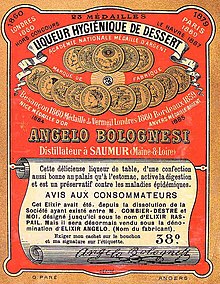

An elixir is a sweet liquid used for medical purposes, to be taken orally and intended to cure one's illness.[1] When used as a pharmaceutical preparation, an elixir contains at least one active ingredient designed to be taken orally.
The word was introduced in late Middle English, through Latin from the Arabic الإكسير (al-ʾiksīr), which in turn is the Arabization of the Ancient Greek ξήριον (xērion) 'powder for drying wounds' (from ξηρός (xēros) 'dry').[1] For centuries, elixir primarily meant an ingredient used in alchemy, either referring to a liquid which purportedly converts lead to gold, or a substance or liquid which is believed to cure all ills and give eternal life.
These are used as solvents or vehicles for the preparation of medicated elixirs. Active ingredients are dissolved in a 15–50% by volume solution of ethyl alcohol:
These include:
Daily non-alcoholic non-caffeinated 'vitamin drinks' have been popular in East Asia since the 1950s, with Oronamin from Otsuka Pharmaceutical perhaps the market leader. Packaged in brown light-proof bottles, these drinks have the reputation of being enjoyed by old men and other health-conscious individuals. Counterparts exist in South Korea and China.
Western energy drinks typically have caffeine and are targeted at a younger demographic, with colorful labels and printed claims of increased athletic/daily performance.
See Patent medicine.

An elixir is a hydro-alcoholic solution of at least one active ingredient. The alcohol is mainly used to:
The lowest alcoholic quantity that will dissolve completely the active ingredient(s) and give a clear solution is generally chosen. High concentrations of alcohol give burning taste to the final product.
An elixir may also contain the following excipients:
Elixirs should only be stored in a tightly closed, light resistant container away from direct heat and sunlight.